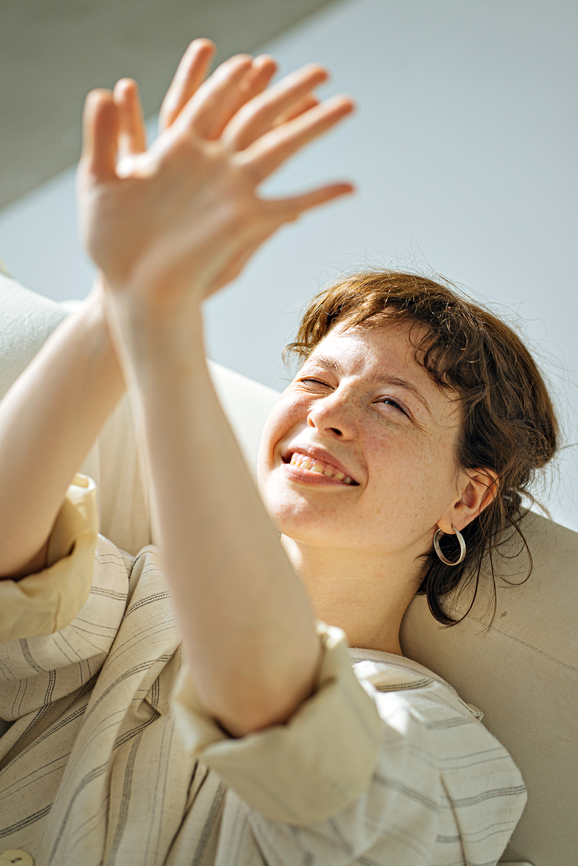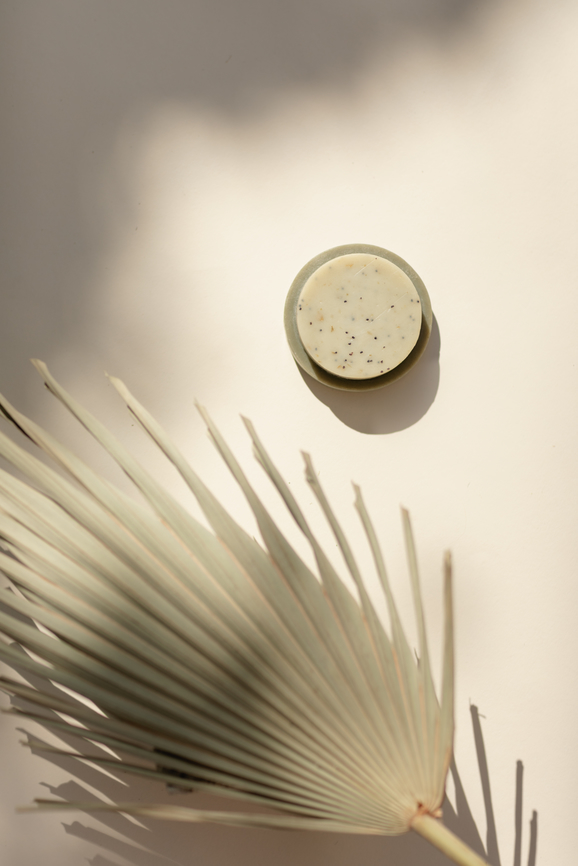
Is It Anxiety Or Intuition? Here’s How To Tell (According To A Psychic)
My relationship with morning workout classes and being on time isn’t totally symbiotic. On this particular late July morning, I was rushing — as usual— from my Brooklyn studio to a 9 a.m. barre session in the next neighborhood over. While hustling down Berry Street in my not-favorite fitness gear, messy bun, and mismatched socks, I spotted him. Waiting outside a coworking space in a gray suit, my future husband smiled at me.
In another universe, I would’ve enjoyed a meet-cute during a morning walk with iced coffee and my dog in tow, and I would’ve definitely worn an outfit that made me feel empowered (without mismatched socks). Instead, I smiled and he smiled back. I kept walking. But when I made eye contact with this mysterious stranger, a little voice in my head chirped: “You should start swiping on that dating app again.”
“When I made eye contact with this mysterious stranger, a little voice in my head chirped.”
Later that night, I took out my phone and scrolled through potential dates. A few swipes later, I saw him again. I swiped right and the screen changed: instant match. Two weeks later, we went on our first date, and eighteen months after that, dear reader, I married him. Wild, right?
And that calm voice in my head? It resurfaced again, years later. It was a completely mundane, almost forgettable moment: On my laptop, I browsed writing jobs and a listing popped up for a role on a site I was a fan of, and my mind announced in a completely casual voice, “If I apply to this job, I’ll totally get it.”
“I had a hunch where I had no evidence to suggest something was going to come to fruition except a gut feeling.”
I applied. That very next day, an email from that job’s HR department popped into my inbox; they invited me to schedule a phone screening. Long story short: I sped through the interview process because the hiring manager was about to go on maternity leave and I had a brand new role in less than ten days.
So, what did I experience? In two separate but pivotal moments, I had a hunch where I had no evidence to suggest something was going to come to fruition except a gut feeling and an overall sense of just knowing. What I’m describing here is my personal experience with intuition. 📡
What is intuition?
What is intuition exactly? And, does everyone have it? In a manner of speaking, yes. According to psychic medium, animal communicator, and host of the podcast Dear Witchypoo, Angela Lovell, “Intuition is knowing without reasoning. It is a gut reaction. It’s that moment of clarity that pops in before analyzing an issue or succumbing to anxiety about the outcome.”
We all navigate our daily lives with some form of intuition but we may not realize it (or confuse it with anxious thoughts and feelings). Lovell describes her intuitive downloads as the most clear when she is not emotionally attached to the outcome of a particular situation like travel, money, or friendships.
Even psychics experience anxiety-presenting as intuition. “Most psychics can read themselves, but it can get tricky reading situations to which I’m personally attached,” she says. “My own fear and anxiety often cloud intuition around seeing things clearly for myself.” A good solution around those dreaded fear feelings? Lovell employs some easy tactics in her well-being routine to strengthen intuition and keep anxiety at bay (more on intuition tips in a minute) and swaps readings with other psychics.
What types of intuition exist?
Intuition isn’t one-size-fits-all, and it can come at different points in our lives or be received in a few different ways. For each person, how that psychic download or information is perceived will be different.
Below, Lovell breaks down the most prominent types of intuition you can experience:
- Clairvoyance: Having visions or seeing images that resemble a photograph or a snapshot.
- Clairsentience: A gut reaction that can include experiencing bodily sensations or feelings.
- Claircognizance: Knowledge dumped right into your brain. This feels instant or quick.
- Clairaudience: Hearing short phrases, voices, or sounds; typically feels like a direct but short message.
“Professional psychics usually possess more than one,” she says, “But anybody can detect and refine their own.”
What is the difference between intuition and anxiety?
As discussed above, intuition often feels calm and stable, and it may even feel neutral or objective. For many folks, anxiety can present as rapid and even circular thought patterns, a racing heartbeat, dread, and typically doesn’t feel like a stable presence at all.
“It’s natural to confuse the two until you get the hang of your own personal intuition.”
“Real intuition comes in cool and clear without emotions,” Lovell says. “Sometimes a person will experience chills or a ringing in the ears as intuition hits.”
To put it simply, anxiety just hits differently but it can still be subtle. Lovell explains: “Anxiety, however, will often come with a bellyache or jolt of pain. Intuition strikes without warning, like lightning. Anxiety starts like a small fire that quickly spreads.”
On paper, this may seem very easy to discern. In the moment, your mind might be telling you otherwise. This means when we’re trying to make choices or seek answers, it can be hard to tell the difference. But don’t fret, it’s natural to confuse the two until you get the hang of your own personal intuition.
“Intuition works when you aren’t living in the future about the outcome, but are working proactively in the present to achieve your goals.”
Before trying some intuition-boosting methods, Lovell has an overarching piece of advice: Intuition works when you aren’t living in the future about the outcome, but are working proactively in the present to achieve your goals. Which means, you are calm, neither afraid nor excited. Most often, you were focused on something else, and not worrying over an outcome, when the info hits you.
Here are a few simple practices to help you avoid scratching your head, wondering if a passing thought is intuition or fear. Lovell outlines four easy-to-use tactics that can help you tap into the ability to separate intuition from anxiety:
- Practice detachment from outcomes. “It’s not easy, but if you can avoid fantasy or fretting over something you seek clarity on, your natural intuition will have space to take over,” she says. “Flooding your system with emotions over the desired or feared outcome will cloud your intuition.”
- Engage in morning clarity. “We have tremendous clarity the moment we wake,” Lovell notes. “As soon as you open your eyes, pull the issue in that you’d like to intuit. It’s the clearest moment of the day and the best time to trust the instructions you receive.”
- Notice physical sensations. “Pay attention to the physical differences between your body experiencing anxiety and intuition. We all have a person who puts us on edge,” she notes. “What reaction is your body having when they’re around? Are you jittery, sick to your stomach, or breathing differently? Now think about that time you just knew you should change your flight, but didn’t and ended up stuck at the airport for an extra day. What were you doing when that info hit? Where did you feel it? Were you actually focused on something else when it hit? Pay attention to the forms intuition takes.”
- Take a cue from Star Trek. “I often think of intuition as Spock and anxiety as Captain Kirk. Spock just knows things — he never gets heated or panicked. He relays information and seeks solutions without attaching to outcomes,” she says. “Meanwhile, Kirk is often sweaty, shouting, red-faced, and volatile.”
Okay so, now that we have tools to know the difference between anxiety and intuition, how can we go about strengthening our intuitive sense?
How to strengthen your intuition
The good news: Lovell says that everyone is born psychic. So, anyone and everyone can access — and strengthen — their intuition. “Humans relinquish their personal power to religion, technology, or monetary goals, allowing these means to determine their self-worth,” she says. “When I do Psychic Coaching, the main issue I see with people is a block, usually in the form of unworthiness. We get so used to being told what to do that we stop trusting our own instincts.”
If you’ve been feeling separated from your instincts, Lovell says that there are many practices a person can do to build up their abilities, but it’s usually blocks that cause plateaus in development. “A common example is that someone will see or hear a spirit just once in their lifetime, then close their third eye forever because the experience was too terrifying,” she says. “Sure, that works if you never want to see spirits again, but it also blocks your intuition.” So, what can you do? Be open, practice non-attachment, and don’t be afraid of emotions.
“Be open, practice non-attachment, and don’t be afraid of emotions.”
And, don’t forget to set intentions. Lovell adds, “Set intention each day in the form of prayer or affirmation, by asking, ‘Please bring me what I need, not necessarily what I want,’” she says. “If you set this intention every day, you will develop a more trusting relationship with your spirituality or belief system.”
If you feel like it’s taking a while to get into the swing of intention-setting, Lovell reminds us to stick with it. “It can be a challenging practice at first,” she says. “When you lose something or someone you love, you have to let go and trust that space was cleared so something in better alignment will fill it.”
It might also help to line up your intentions with your spiritual practice. Maybe it’s something you do in the mornings as you journal, perform a ritual, or pray. Lovell shares: “As you step into your personal power, you’ll find your highest callings and most prominent place in this world by maintaining your spiritual practice.” Intuition, unlocked.
Stephanie Valente is a copywriter and editor covering wellness, commerce, lifestyle — and more — for publications like Brooklyn Magazine and The Good Trade. Based in Brooklyn, she’s often writing poetry, getting lost in a book, or hanging out with her dog.



